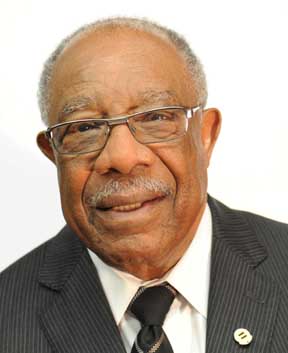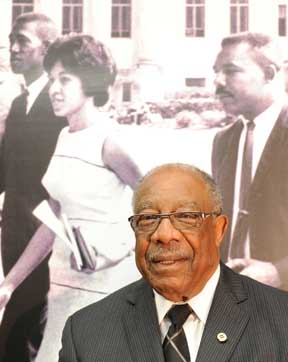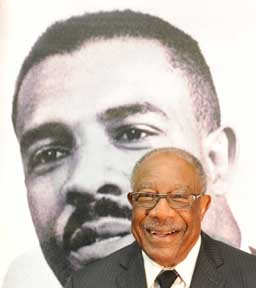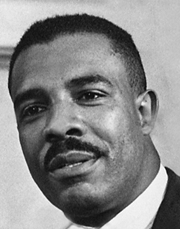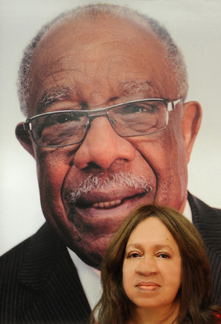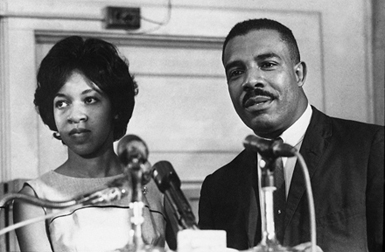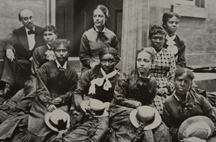

1963-2013: Desegregation—Integration |
|||||||||||||||
|
James Solomon, a Georgia native, served in the United States Air Force before attending Morris College in Sumter. He was graduated from Morris College with a B.S. degree in chemistry and continued his education at Atlanta University, receiving a M.A. degree in mathematics. He returned to Morris College as a professor of mathematics, during which time he applied for admission to USC. He would subsequently serve as Dean and Vice President at Morris College before taking on state-wide responsibilities as Executive Director of the S.C. Higher Education Facilities Commission. He would serve as Director of Facilities & Planning at the Commission on Higher Education and as Commissioner of the Department of Social Services. He was the first black to be elected to public office in Sumter County since Reconstruction, and he has served on the school boards for Sumter School District 17 and Richland One School District. |
||||||||||||||
“I was in Sumter teaching at Morris College and involved with the student leaders there. In some of our discussions we talked about the desegregation of USC. I had wanted to initiate a law suit, as did Harvey Gantt at Clemson University and Henrie and Robert at USC. But I thought time had passed me by. I was a faculty member (professor of mathematics) and had a family; yet, I still wanted to do something. I don’t know why except that I had been through many life experiences—the military where I confronted racism—and in the early stages of the Atlanta Movement in the 1960s. And, I knew Martin Luther King. We were high school students together, before he became Dr. King. I was feeling that the many people I knew had done something significant for the civil rights movement, and I was asking myself what I had done.
I decided after talking to my wife that I would just submit an application to USC since Henrie and Robert had already been admitted. If I was admitted, this would say to my students and to others that USC was indeed desegregating—if a black student wished to attend, then you could just submit an application and take the required exams. My wife, Helen, finally agreed, and I talked to the president of my college who thought it would be good for Morris and an inspiration to our students.”
|
|||||||||||||||
“So I requested an application. I always wondered whether they knew that I was black when they sent the application form to me since Solomon is a good Jewish name. I received the application and a letter from the Dean of the Graduate School saying that I would need to take the GRE. At that time, I suspected that USC then knew I was black, since I had listed on the application form degrees from Morris College and Atlanta University. When I took the GRE, my arrival at the testing site was a media event, and I remember thinking that if I don’t score well enough to be admitted the whole world would know it. I scored well enough and was admitted.” |
|||||||||||||||
“On the day of registration, Robert, Henrie, and I met at Judge Matthew Perry’s office. We came to campus that morning, the 11th of September, in Matthew’s car with a police escort. We arrived at the Osborne Building; we were the only students registering. Robert and Henrie were registering downstairs, and since I was registering as a graduate student I went upstairs where the Dean of the Graduate School was waiting for me. Papers were already filled out and all I had to do was sign. Then we were to attend a news conference. In fact, the most recognizable photograph of that event was of the three of us coming out of the Osborne building heading to the news conference.” James Solomon |
|
||||||||||||||
“Jim Solomon and I learned the meaning of virtual friendship long before social media brought us LinkedIn, Facebook, and other methods of quick communication that simply said ‘I am here; I am fine. I know you are here somewhere and I hope that you are fine.’ Jim’s affect was always one that gave comfort, that reminded me in unspoken words to ‘stay on the path’ for the future. We had little or no contact on campus except at special events. But I have followed his career throughout the years and take great pride in his solid contributions to the City of Columbia, to the black community, and to the State of South Carolina. He always carried himself with great pride and dignity. He studied at a different level so the brambles and thickets that Bob and I negotiated were not in his pathway. But I am sure that he has his story and perspectives. He has much to teach. And, we have much to learn from what he saw, what he did, and how he has achieved his wonderful career.” Henrie Monteith Treadwell |
|||||||||||||||
|
|||||||||||||||
|
|||||||||||||||

to next exhibit

an institutional member of the International Coalition of Sites of Conscience
Museumofed@gmail.com

